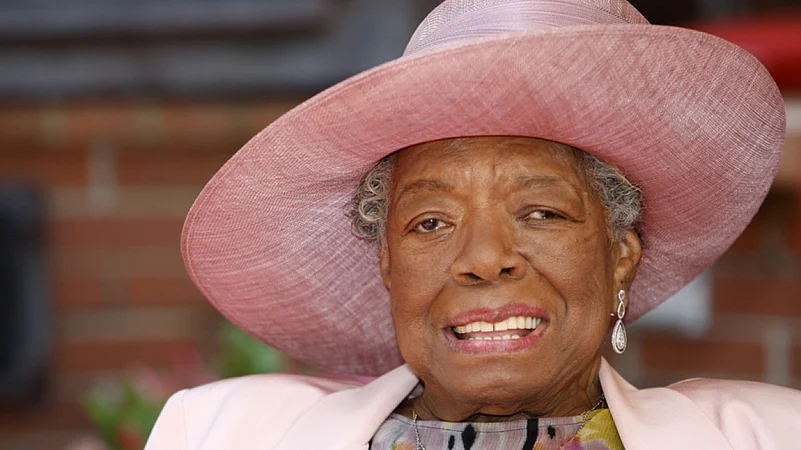Maya Angelou, an inspiration, an embodiment of strength and a voice of oppression and acclamation. A black woman remembered as a poet, memoirist, and civil rights activist, chronicling the African American experience in America. Her Poems were powerful and evoked intense emotions that many people suppress during times of grief, which can help in the healing process. Her poems awaken us to new possibilities by allowing us to transcend our ordinary experiences and limitations. Her writings propelled readers from apathy to empathy and toward possibilities, it transformed the way we perceive our own identities and capabilities.
Angelou's contribution to literature and the black community has been vital as her works detailed the effects of racism and sexism on the individual and their sense of Identity. A pioneer of brilliant characterization, her work was cutting edge as it used fictional writing techniques like dialogue and plot structure to tell her non-fiction memoirs. Maya’s work brought a fresh perspective on the African American struggle to thrive despite living in a society dominated by whites. She lived a life with experiences as varied as becoming the first black female streetcar conductor, being cast as a member of the musical Porgy and Bess, working jobs as a fry cook, dancer, playwright, a newspaper correspondent in decolonizing Egypt and Ghana. She was also the Southern Christian Leadership Conference coordinator, the first black woman director in Hollywood and a Professor of American Studies. These lived experiences became the background through which Maya described the complexity of African American Identity.
Born in St. Louis, Missouri, on April 4, 1928, as Marguerite Johnson, Maya Angelou witnessed the racist madness and inhumane provisions of Jim Crow segregation laws while growing up in St. Louis and Stamps, Arkansas. Her many autobiographical books recount her life in various stages while touching upon themes of racism, identity, family, and travel. Her first autobiography, I Know Why the Caged Bird Sings tells of her early years living in St Louis and Stamps. The book recalled the sexual abuse she faced at the hands of her mother’s boyfriend and his subsequent murder supposedly by her uncles, an incident that had put fear in Maya’s mind about the power of words to the extent that she became mute. Despite the violence and other wrongs faced by Maya, the story she tells is of upliftment. I Know Why the Caged Bird Sings was nominated for the National Book Award. Her subsequent works explored the manner by which race, sex, family, community and cultural memory shape an individual and give them strength, all the while giving an account of the extraordinary life led by Maya. Gather Together in My Name (1974) tells of the time when at seventeen Maya was a young mother, struggling to raise her son. Singin’ and Swingin’ and Gettin’ Merry like Christmas (1976), was the chronicle of her tour in Europe and Africa with the caste of the African American opera Porgy and Bess.

On her return from the tour, Maya heard Dr Martin Luther King speak and was inspired to join the civil rights movement. She worked as Northern coordinator with Dr King’s Southern Christian Leadership Conference. The book The Heart of a Woman (1981), gives a description of Angelou’s work for the civil rights movement and her acting and writing career in New York. In 1962 Maya moved to Cairo and worked with the Arab Observer for a year as a journalist. Later she moved to Accra, Ghana and continued to work as a journalist while working at the University of Ghana. A chance meeting with Malcolm X in Ghana convinced her to move back to America to support Malcolm X’s vision of Afro-American harmony. However, soon after coming back to America, Malcolm X was assassinated. Maya’s book All God’s Children Need Traveling Shoes (1986) describes her travels in West Africa and her decision to return to America without her son.
Maya’s last autobiography A Song Flung up to Heaven (2002) took fifteen years to write. The time covered in the book though only four years, they were some of the darkest in Maya’s life. Covering the time from Malcolm X’s death to the assassination of Martin Luther King, the book describes the troubling changes in the country and Maya’s life, and the panacea she found when she was compelled to practise writing. Back in New York and engaging in the civil rights movement, Maya met James Baldwin and other African American writers at the Harlem Writer’s Guild who challenged Maya to write her story. As a response to the challenge, she wrote I Know Why the Caged Bird Sings.

The autobiographies only covered Maya’s life up till her early 40’s. Following her first autobiography, Maya also dabbled in poetry and her first compilation of poetry Just Give Me a Cool Drink of Water 'fore I Diiie (1971) was nominated for the Pulitzer Prize. Other works of poetry by her are “Oh Pray My Wings Are Gonna Fit Me Well, Shaker, Why Don't You Sing?, I Shall Not Be Moved, Wouldn't Take Nothing for My Journey Now, The Complete Collected Poems of Maya Angelou and A Brave and Startling Truth. By 1971, Maya had moved to Hollywood where she wrote the screenplay for the film Georgia, Georgia and composed its score. She produced, directed, wrote, and starred in various stage, film, and television productions. She was known as the first black woman director in Hollywood. In 2013, she published her last biography Mom & Me & Mom which told of Maya and her mother’s life and their evolving relationship with each other and those around them.

Maya’s work gained international interest when she was invited by American president Bill Clinton to write and deliver the poem On the Pulse of Morning at his inauguration in 1993 making her the first black woman to get the honour. In 2010, US President Barak Obama awarded her with the Presidential Medal of Freedom. Maya’s writings were rife with metaphors that speak for the African American life, and the inwards exploration of the feminine black experience. Her biographies and poems written in her signature manner allowed her readers to understand the layers of African American existence. Some critics have at times claimed that her work is solipsistic and superficial but the cultural position of her writings and the many awards that she received are a sign of her impact and importance.





















